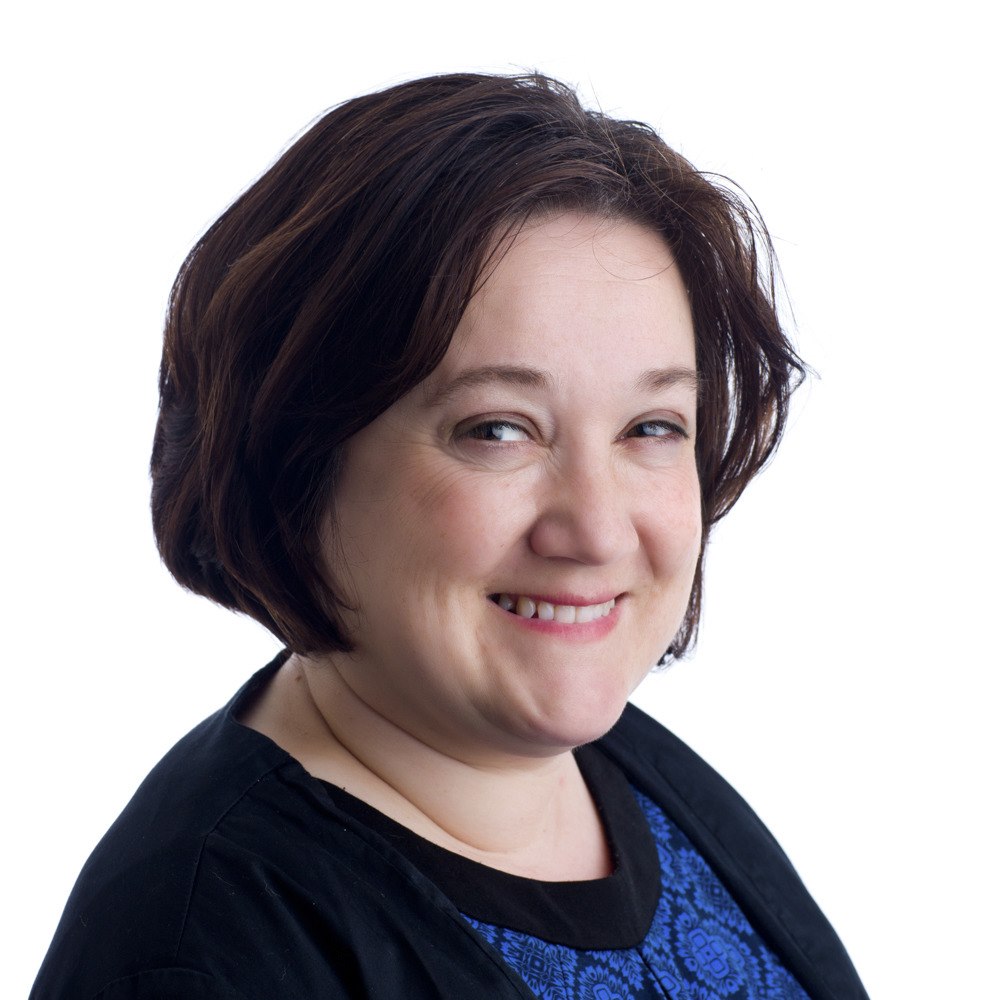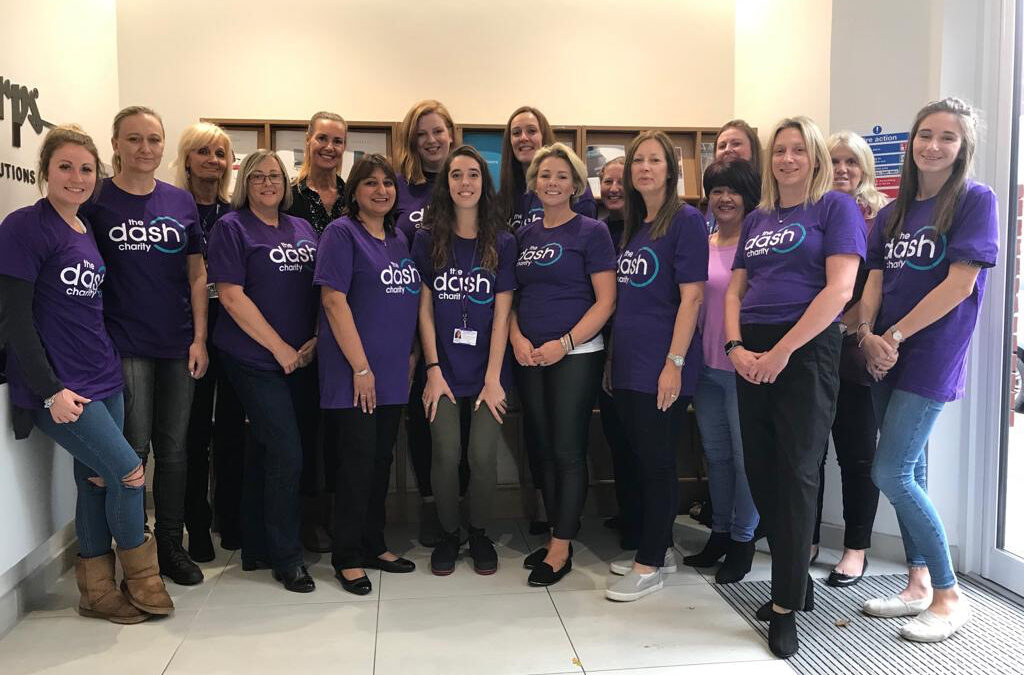Caron Kipping with her Dash Charity colleagues. She is the lady with the grey shoes in the front row.
Who is Caron Kipping from the Dash Charity?
Caron Kipping is a survivor of coercive control. She has worked at The Dash Charity domestic abuse charity for 14 years as an IDVA (Independent Domestic Violence Advocate) and trainer and is the author of ‘Recognition to Recovery – How to leave your abusive ex behind for good!’

What is the mission of The Dash Charity?
The Dash Charity’s mission is to safeguard women, men, and children affected by domestic abuse in the Royal Borough of Windsor and Maidenhead South, East Berkshire and South Buckinghamshire.
What services do you offer and to whom?
We offer a range of specialised services that keep people safe and break the cycle of domestic abuse. We support people of any age and any background whatever their gender, ethnicity, religion, sexual orientation, disability or language barrier.
We’ve been around for a long time, 45 years already. We have lots of experiences, plenty of specialty knowledge, most of our staff, have worked here for at least 10 years. We have developed really good relationships within our team and understanding of the community, and built strong relationships with local professional partners. We have a strong reputation. The public and professionals trust that we help put the right kind of support, right away. For the right range of services.
We offer children’s service therapeutic services for children and young people from age six or seven up to 19. One of the things we work on is to help them create healthy relationships of their own.
We also have parenting groups and currently three refuges with 14 families of women and children. We have a children’s team that goes into schools and colleges with educational programmes.
We give a training on all aspects of domestic abuse to employers wanting to understand how to keep their staff safe at work and to professionals working with vulnerable people, such as social workers and the police.
What was the inspiration behind the creation of the charity?
The charity was started by a lady who opened a house for women who needed to flee domestic abuse but the house was rundown and not a nice place to live.
A representative of a local corporation saw the state of the house and was appalled. She spoke to the women minister in government and told them about the living conditions that women had. She was granted a million pounds to turn it into much nicer spaces. She also became the chief executive of the charity.
The charity has grown and shrunk depending on the years over 45 years, going from two refuge locations to now three locations.

If you had to name the values which guide you as a person, which would they be?
Honesty: I’m always upfront with the clients. First, we say everything is confidential, but if we have concerns, we will share them with others. We can only help if clients are honest, sometimes they hide things from fear of being judged, blamed turned away. If we have limitations or asking if not right.
Respect: It’s so important. People should feel respected, and as people who are helping them we should feel respected too. We teach young people about respecting themselves and respecting others
Happiness: Everybody deserves happiness. Life is too short to be unhappy is my mantra. In abusive relationships so much of your energy is spent on the other person that you end up being really unhappy.
What is typical of living in the North and the South of England that you have adopted in your work?
I’m originally from Yorkshire, the North of England, which is very traditional. At the weekend, men go to the pub, and the women cook a Sunday dinner. People have very few aspirations, especially for women. I grew up in a very industrial town few activities and not a lot of green spaces. Everything is very slow paced.
At age 18, I moved to the South. I would go back to the North to visit, but not to live there anymore. In the South, there are lots more opportunities. Women are inspirational, supportive of other women. They are driven and set goals. Opportunities open up your mind. The downside is that the women are so driven, that it is quite a status-based culture so it’s difficult if you end up in an abusive relationship.
Everything is much more expensive. You feel trapped because you can’t afford to live anywhere else. So, in general, British culture’s expectations is that you get into a relationship get a house, get 2.2 children and that you live happily ever after. You smile and say I’m fine, and you don’t talk about it until things are really bad.
In the North. everything that’s more open. We use a cup of tea and a chat, and it solves everything.
Have you done any volunteer work? How did this experience prepare you for/complement your current job?
I started as a volunteer that for two and a half hours a week at the Dash charity, and I quickly realised that’s what I wanted to do. I loved the volunteering but I was not sure in the beginning. I was nervous because of my personal experience I have with domestic abuse that that would bring some flashbacks, and I have not spoken to anyone about it.
And when you do that, you think that what happened to you is the worst that could happen to someone but when you volunteer you quickly realise that some clients have been through much worse stuff than you.
I did not have to hide my experience, nor did I feel judged because of it. I actually had moved on. I did not want it to drag me back. It was hard to switch off that I did, and I got stronger. I learnt how to manage boundaries.
Often when you volunteer you want to save the world but you have to also accept that clients also have a personal responsibility for their own situations. And with the help of colleagues with more experience, we can all recognise in the team when someone is upset, frustrated, or is having a hard time.
When was the last time that you were touched by a clients’ reaction?
Yesterday I went to a wedding of a client whom I met when I volunteered at Dash. I had supported her several years ago and it was nice to see her in a happy place.
I met her lovely new husband, and he thanked me personally for the support to his wife and daughter. The children’s team turned her situation around and she’s thriving now.

Any exciting news about your organisation?
It is Dash’s 45th anniversary this year, our yearly campaign’s theme is based on the number 45. We thought that there were many ways that people can help through the theme of 45. You could be walking 45 miles for fundraising or you could be baking 45 cakes.
Our campaign is called The Power of 45.
During the pandemic referrals to a children’s services tripled. We hired a new children worker and we are planning a children’s hub. That would be a bespoke space, a place for children and young people who deal with that anxiety and have additional needs. It would be for indoors and outdoors activities as well as group activities. We could expand workshops and training sessions with that space. It would be a physical space, which we have not found yet. It would have to be accessible for people with disability as well. So, we are considering purchasing a piece of land, and having that building built.
It would have to be a visible space in a central location. We want the community to be aware about what we do and break taboos, and for people who need our services to find it and pop in for quick questions or to join our programmes.
Who would you like to connect with for your organisation?
We are looking for donations for the hub. If you know anyone who would like to leave a legacy and who would like to donate such a piece of land or fund that would be amazing. In the beginning we rented the space, but it got too expensive. We had to move home three times in the last few years. We worked on Zoom with children during lockdown, but it would be so much better to be for them to be active and socialise and talk a lot, among one another one in person.
It would change a whole generation and prevent further hurt. It would break the cycle of domestic abuse for a whole generation, so that they don’t fall into old patterns of the previous generations. It would rebuild bonds between parents and their children. It would be a positive inspirational place for people who have been through tough times, but realise that they can be okay because we’re here to help you.
It’s an innovative approach and we hope we can find people to support us towards that mission.
How can people reach you?
If you enjoyed Caron Kipping‘s interview, you will probably like Ewelina Maria Chin’s as well!

This interview was conducted by Lucie Cunningham from Tell Them Well Communications in September 2021. Lucie is a freelance editor, copywriter and translator with over 10 years of community project management. She maintains a list of UK charities serving women and or girls. She has lived in France, England, The USA, the Netherlands and is currently based in Scotland.



